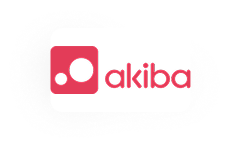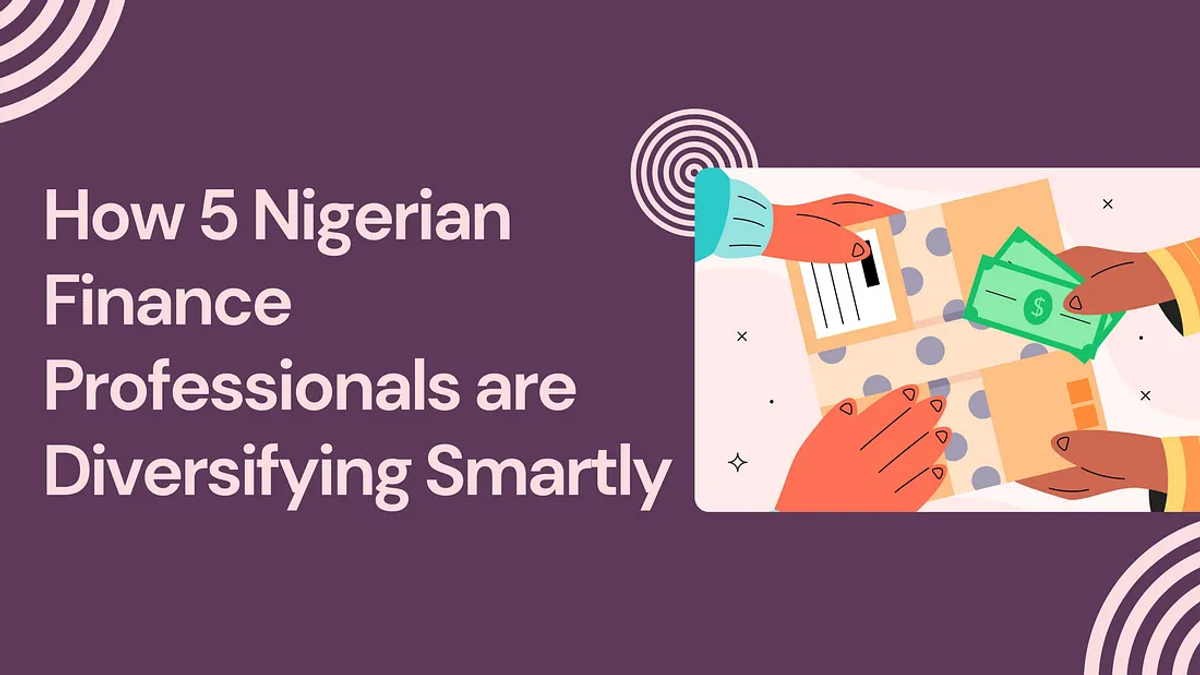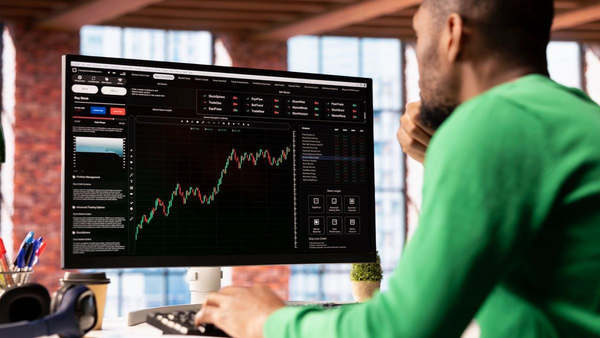When it comes to investing, one thing is clear: there is no one-size-fits-all strategy. Risk appetite, life stage, income flow, and personal goals all shape how we build and rebalance our investment portfolios. And in today’s economy, marked by currency swings, rising inflation, and shifting asset performance, knowing how to diversify is very key. It’s survival.
But what does diversification look like in real life? We spoke to five Nigerian financial professionals to understand how they are navigating today’s market, balancing risk and return, and building resilient portfolios.
Here’s what they told us.
*Names have been changed to protect their identities.
1. “Pooling funds with friends gave us access we couldn’t get alone.” — Ola, 30s, Medium-High Risk Investor
For Ola, diversification is not just about spreading money across sectors — it’s about pooling funds with like-minds. He’s part of a joint investment group that has allowed him to spread risk and seize more opportunities.
“If I have ₦1 million, there’s only so much I can do. But if ten of us each contribute ₦1 million, that’s ₦10 million. We can put ₦1 million into ten different stocks. That’s already diversification with potential for higher dividends and returns.”
His portfolio is largely split between equities (stocks) and commercial papers, though he also dabbles in other assets. He believes in holding stocks long term, especially dividend-paying ones like Presco, which he bought at ₦400 and is still holding even as it trades above ₦1,200.
“Presco is one of those stocks I strongly believe in. It’s a good company, it pays dividends, and I see long-term potential in it. Even if it gets overvalued at some point, I can always sell and re-enter.”
Ola looks at sectoral diversification as well. His equities are spread across banking, consumer goods, and industrials. He reviews his portfolio monthly but doesn’t make changes unless necessary. His personal risk appetite is high, but within the group, the diversity of opinions and larger capital base make risk-taking more strategic.
He keeps his investments mostly local for now, not because he’s unaware of global opportunities, but because of the naira’s recent rebound.
“If the naira is stabilizing or even strengthening, buying dollar assets might actually reduce your returns.”
But it hasn’t been all smooth sailing. His biggest mistake? Buying a stock purely based on sentiment — it dropped 50% the following week.
“I still hold it, but yeah, I didn’t do proper analysis. I wanted some energy exposure and jumped too quickly. It looked like a mistake, but I’m still holding for the long term.”
Top 3 investments: Nigerian equities, commercial papers, crypto (with caution)
Lesson learned: Make proper research before going into any investment, and make sure you understand it.
2. “Start small. Build the habit. Don’t invest in what you don’t understand.”– Naomi, 20s, Low Risk Investor
When Naomi started investing, it wasn’t with a lot of money or a perfectly built-out portfolio. It was with a mindset: start with what you have and build your knowledge along the way.
“Honestly, mutual funds were the easiest entry point for me — they’re flexible, you can start small, and they help you gradually build your way into diversification.”
Her approach is practical and relatable, especially for young Nigerians juggling multiple responsibilities and unpredictable expenses. “Even if it’s ₦5,000 a month, that consistency matters. You’re building the habit first — not just chasing returns.”
For her, diversification is less about chasing every shiny new investment and more about mixing instruments based on your risk appetite and financial goals. Currently, her strategy combines mutual funds, commercial papers, and a cautious approach to stocks.
“Commercial papers are great for short-term returns. If you place funds in April, by September you’ve made your interest — no stress.”
She breaks down commercial papers simply — a fixed-income instrument that gives you your return upfront through a discounted value. For her, they are like a short-term savings box.
But she isn’t entirely risk-averse. Naomi believes that over time, every investor should dip into the stock market, just carefully.
“Even if you don’t have a high-risk appetite, you can start small and slowly get comfortable. Just don’t randomly buy any stock. Look at fundamentals. Look at timing. Banks, for example, were not really attractive after their FX losses last year but they’re bouncing back now.”
She also notes how volatility affects investor psychology. “You need to be honest with yourself. If you can’t stomach the swings, don’t put everything in stocks. The market changes fast, one week it’s bearish, the next, dividend news breaks and everything rallies.”
On portfolio construction, Naomi believes in balancing high-yield instruments with safer assets.
“I don’t want to just lock my money up and panic when I need it. So while I love mutual funds and commercial papers, I also keep a portion in more liquid options — like high yield savings account that earn interest on dollars or naira.”
She shared her experience with a platform offering dollar savings that pay interest while giving her the flexibility to withdraw at will. “It’s not locked. So if I need it for an emergency, I can access it, and I’m still earning on it.”
At the end of the day, for Naomi, diversification is not about trends or hype. It’s about control, intention, and knowing yourself.
“Start small. Understand what you’re doing. Mix your assets based on your life, not someone else’s Twitter thread.”
3. “Everything I Do Now Is Informed by Lessons” — Ada, 20s, High Risk Investor
For Ada, diversification didn’t start with theory, it started with lessons.
“There was a time I moved all my money from different investments into one platform. My friend had told me about it. The returns looked great. But it turned out to be a bad move. I didn’t get that money back.”
The experience shook her. Since then, her portfolio is not only more balanced and more thoughtful. Every asset class she enters is backed by research, timing, and a clear reason for why she’s there.
Today, her investment portfolio is split across multiple asset classes and geographies:
- U.S. stocks
- Nigerian equities
- Alternative investments (film production)
- Emergency funds in mutual funds
“In the U.S. market, I’m holding ETFs like VTI and SPY. I also wanted to get into VOO, but I kept missing the right entry price, by the time I’m ready, it’s always moved past my budget.”
In Nigeria, she’s selective about sectors and tilts heavily toward dividend-paying stocks. “I focus more on banks, consumer goods, and companies I understand. I’m long-term, so I don’t need to check prices every week, but I want to hold stocks that pay me [dividends] while I wait.”
Beyond stocks, she recently invested in the production of a Nollywood movie.
“It’s an entertainment fund through my workplace. We backed a movie that premiered last year, and I’m expecting returns soon. That’s a new space for me, but I know the team and the project, so it made sense.”
She also maintains an emergency fund through a mutual fund and keeps her strategy consistent, investing a portion of her income every month, regardless of what the market is doing.
“Even if the market is down, I still invest. That monthly budget helps me stay consistent, even if it’s a small amount.”
When asked about her risk appetite, she says she’s in the medium to high category. But with caveats.
“It’s not that I love risk. I just now know better. I only take on what I understand. Even with things like real estate or crypto, I don’t rule them out, I just wait until I have enough information to go in confidently.”
When asked what 3 things she’d invest in long term, she picks:
US ETFs like VTI and SPY for broad exposure to the U.S. stock market
Dividend-paying Nigerian stocks with long-term growth potential
Herself for personal growth which to her, is the biggest investment.
Her Biggest Mistake?
“That one time I got carried away by hype and moved all my money into one ponzi platform… I didn’t get anything back. I learned the hard way. Now, I don’t chase quick returns. I plan.”
Her approach now is long-term, goal-oriented, and patient. The pain of the past informs her present, and her focus today is not just on growth, but sustainability.
“I’m trying to build wealth. Yes I want to grow, but I want to grow wisely.”
4. “You can’t copy someone just because it worked for them.” — Kemi, 20s, Low-Medium Risk Investor
For Kemi, the first rule of investing is simple: your risk appetite must match your reality.
“Everyone’s income, family situation, and obligations are different. So your portfolio has to reflect that. You can’t copy someone just because it worked for them.”
A self-described cautious investor, Kemi doesn’t chase the highs of the equity market not because she doesn’t understand it, but because her lifestyle and financial goals demand more predictability.
“I barely touch equities. They’re volatile. Anything can happen in a week — gain 20%, lose 50%. That kind of swing isn’t what I need right now, for my own goals.”
Instead, she splits her money across carefully chosen assets based on income stability, time horizon, and currency protection. Her portfolio has four core pillars:
- Fixed income and commercial papers
- Foreign currency savings and dollar-denominated investments
- Long-term Nigerian equities (buy-and-hold only)
- Structured budgeting for bills and emergency savings
Each month, she breaks her salary down into savings, bills, and investments. From her investment portion, about:
- 40% goes into fixed income and foreign currency assets
- 30–35% is allocated to conservative instruments and savings
- 25% is in Nigerian equities, strictly buy-and-hold
Her reasoning for this structure is strategic: protect her capital from inflation and currency devaluation while still growing it over time.
“If I didn’t put part of my money in dollar assets, I would have lost so much value. At one point, the naira was ₦450 to a dollar, then it spiked to ₦1,000+. You can’t ignore that.”
To protect against these swings, she keeps part of her savings in dollar-based savings platforms that pay interest that might not be flashy, but secure. Her investment account, however, is different. While she’s not yet in dollar-denominated fixed income products like dollar bonds or mutual funds, it’s something she’s actively researching.
“It’s not just about what gives the highest returns. I care about how easy it is to access, how transparent the platform is, and whether I have to rely on someone to manage it for me. I want to be in control.”
She makes it clear: being a finance professional doesn’t mean she’s immune to mistakes. In fact, one of her biggest investing regrets happened not too long ago.
“Someone told me the dollar would crash. So I sold all my dollars at ₦700/$, hoping to buy back at ₦500. It never dropped. It kept rising.”
What was meant to be a smart currency trade ended up being a loss. She sold at a “peak” that turned out not to be one and couldn’t buy back at a lower price.
“I didn’t even need the money. I was just trying to flip it based on advice that sounded confident. But that loss taught me — nobody really knows.”
Since then, her guiding principle has become crystal clear: do your own research, and invest at your own pace.
Top 3 investments: Fixed income, dollar savings, local equities
Lesson learned: Budgeting is not just for bills. Plan for your investments with the same intention.
5. “Take risks early. But learn how to think for yourself.” — Dayo, 40s, Medium-Low Risk Investor
Dayo used to be aggressive in his early 20s, a strategy that worked until it didn’t. Now, he balances his portfolio across:
- 40% fixed income
- 40% equities
- 20% discretionary, high-risk plays
“I don’t chase market highs. If a stock just gained 10%, I wait. I try to buy during dips, not rallies.”
He made his fair share of mistakes. One of them was trying to outsmart the FX market.
He also avoids foreign stocks he doesn’t understand. After losing money during COVID trying to play U.S. tech stocks, he decided to focus on companies he can research and track.
“Just because it’s in dollars doesn’t make it safe. If you don’t understand the market, stay out.”
What does he recommend to younger investors?
“Start with money market or fixed income. Use your youth to try equities, you have time to recover. And if you can, convert a bit to dollars every month. Hedge yourself.”
Top 3 investments: Equities, fixed income (naira and dollar), real estate if the deal is clean
Lesson learned: You’re never too smart to make a bad call. Stay grounded. Follow people, but verify for yourself.
What Young Nigerians Should Invest In
When asked what three assets he’d recommend to someone in their 20s, Dayo kept it practical:
Equities — “You’re young. You have time to recover from risks. Start early and learn.”
Money market or fixed income funds — “Great for capital preservation and earning while you wait.”
FX-based fixed income products — “If you can, change a portion of your money monthly to dollars and invest. It’ll help protect your money.”
He also mentioned real estate as a solid long-term investment if the land is free of encumbrances and well located.
“It’s not just about picking the right asset. It’s about buying it at the right time, at the right price.”
In Summary: Diversification Is Deeply Personal
These five stories show that diversification isn’t just about asset classes. It’s about goals, income, season of life, and your emotional capacity for risk. Every investor we spoke to had their own mix, their own story, and their own scars. But they all agreed on a few things:
- Start early
- Don’t put all your eggs in one basket
- Only invest in what you understand
- Protect your capital, not just chase growth
- Make room for mistakes, but learn fast
In a market like Nigeria’s, diversification is not just a smart idea, it’s a lifeline.


